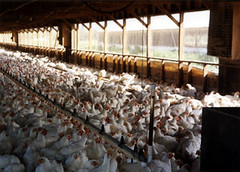The Vatican’s election of Pope Francis hopefully will signal an era of increased awareness and activism that will culminate in the end of factory farming. Taking the name of Francis, after St.Francis of Assisi, the patron saint of animals and the environment, the new pope has set the stage for his agenda, which features compassion for animals and a commitment to the poor.
This attention to the plight of animals is needed desperately in light of the cruel practices of factory farming, whereby animals raised for food are crammed together in close quarters, barely able to move. Chickens and turkeys raised for market spend their entire lives on beds of excrement, while pigs, cattle and calves are raised on slatted floors, which permit their feces to drop below into manure pits. These environments are toxic, with the resulting ammonia fumes from the animals’ waste circulating the enclosed environment, weakening their immune systems and burning their respiratory tracts. Also, penning animals in close quarters results in fighting with pecking and biting, causing injuries, sores and infections. This whole scenario is indicative of the extreme cruelty to animals and deserves the attention of the world and the passage of laws to end these practices.
Additionally, the practice of factory farming, with its inherent contaminated and toxic environment, poses an ever-present threat of disease, necessitating the routine use of antibiotics to treat animals. This is particularly alarming at a time when there is a major concern about the overuse of antibiotics by humans, which is suspected to lead to antibiotic resistance and the development of mutant virulent strains of bacteria and viruses. Permitting the commercial marketing of meat products laced with antibiotics for human consumption is hazardous to human health and should not be outlawed.
Pope Francis also has voiced his commitment to the poor and the Church’s need to address the issue of poverty all over the world. It is noteworthy that factory farming practices are more likely to impact the poorer segments of the population because these individuals are less likely than their wealthier counterparts to have access or means to meat and poultry raised organically, largely due to cost. Nutritionally insufficient diets have been identified as a major contributor to poor health, and the ingestion of products of factory farming clearly is a part of this cycle.
With this new era in the Catholic Church, social activists, farm animal welfare activists and environmentalists look with optimism to Pope Francis and the Vatican to lend a voice to the need to protect animals and humans by adopting the necessary legal measures to end factory farming. To do so is to live green, be green.
Sources For Article:
1. http://www.huffingtonpost.co.uk/sue-cross/antibiotic-resistance-veganism_b_2874898.html?utm_hp_ref=health-news&ir=Health%20News.
2. http://www.huffingtonpost.com/2013/03/16/pope-says-wants-poor-church_n_2889991.html.
3. http://en.wikipedia.org/wiki/Francis_of_Assisi.


